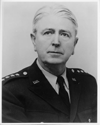Franklin Delano Roosevelt
 Franklin Delano Roosevelt (January 30, 1882 – April 12, 1945), often referred to by his initials FDR, was the 32nd President of the United States. Elected to four terms in office, he served from 1933 to 1945, and is the only U.S. president to have served more than two terms. A central figure of the 20th century, he has consistently been ranked as one of the three greatest U.S. presidents in scholarly surveys.
Franklin Delano Roosevelt (January 30, 1882 – April 12, 1945), often referred to by his initials FDR, was the 32nd President of the United States. Elected to four terms in office, he served from 1933 to 1945, and is the only U.S. president to have served more than two terms. A central figure of the 20th century, he has consistently been ranked as one of the three greatest U.S. presidents in scholarly surveys.
During the Great Depression of the 1930s, Roosevelt created the New Deal to provide relief for the unemployed, recovery of the economy, and reform of the economic system. His most famous legacies include the Social Security system and the regulation of Wall Street. His aggressive use of an active federal government reenergized the Democratic Party. Roosevelt built the New Deal coalition that dominated politics into the 1960s. He and his wife Eleanor Roosevelt remain touchstones for American modern liberalism. The conservatives fought back, but Roosevelt consistently prevailed until he tried to pack the Supreme Court in 1937. Thereafter, the new Conservative coalition successfully ended New Deal expansion, as well as many programs like the WPA, particularly when World War II started.
After 1938, Roosevelt championed re-armament and led the nation away from isolationism as the world headed into the war. He provided extensive support to Winston Churchill and the British war effort before the attack on Pearl Harbor pulled the U.S. into the fighting. During the war, Roosevelt, working closely with his aide Harry Hopkins, provided decisive leadership against Nazi Germany and made the United States the principal arms supplier and financier of the Allies who defeated Germany, Italy and Japan. Roosevelt led the United States as it became the Arsenal of Democracy and put 16 million American men into uniform.
On the homefront his term saw the reduction of unemployment, restoration of prosperity, significant new taxes and controls, 120,000 Japanese and Japanese Americans sent to relocation camps, and new opportunities opened for African Americans and women. As the Allies neared victory, Roosevelt played a critical role in shaping the post-war world, particularly through the Yalta Conference and the creation of the United Nations. Roosevelt died on the eve of victory in World War II and was succeeded by Vice President Harry S. Truman.
Copyright © 2007 - 2025. All Rights Reserved.
Original Coding by Goimage Media Services

